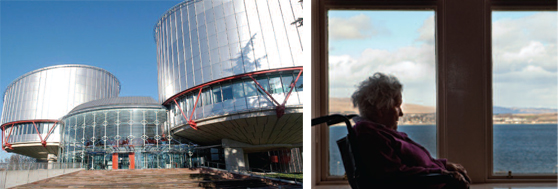How are my human rights protected in law?
In Scotland, your human rights are protected by the European Convention on Human Rights (‘the Convention’), the UK Human Rights Act and the Scotland Act. Your rights are also protected by a range of international human rights laws which, although they can’t be enforced directly in Scottish courts, are monitored internationally.
The European Convention on Human Rights
The Convention was drafted by all the states of the Council of Europe, including the UK, and came into force in 1953. The Council of Europe was formed in response to the atrocities and cruelties of the Second World War and is a regional membership organisation for countries in Europe.
The Convention is made up of a series of Articles. Each Article is a short statement defining a right or freedom, together with any permitted exceptions. The rights in the Convention apply to everyone in the UK.
The Human Rights Act
The Human Rights Act 1998 (‘the Act’) brings most of the fundamental rights and freedoms contained in the European Convention on Human Rights directly into UK law.
The rights included in the Act affect the rights you have in your everyday life: protecting what you can say and do, your right to a fair trial and other similar basic entitlements. Most rights have limits to ensure that they do not unfairly infringe upon other people's rights. Certain rights, however, such as the right not to be tortured, can never be limited by a court or anybody else.
Cases based on the rights and freedoms in the Act can be argued in a UK court or tribunal. The Act also requires all public authorities, such as hospitals, schools, local authorities and courts to comply with those human rights. According to the Act all other legislation should also be interpreted and applied in a way that is consistent with the rights included in the Act.
The Scotland Act
The Scotland Act 1998 established the Scottish Parliament and the Scottish Government. It ensures that the Scottish Parliament can only pass laws that are compatible with human rights. This means that human rights must be respected and realised at all levels of governance in Scotland.

A note on using the law to uphold human rights
Most human rights issues do not need specialist legal advice and can be resolved by communication, advocacy and non-judicial complaints mechanisms: talking to those involved, seeking advocacy support and using existing complaints processes where necessary. The FAIR approach will help you resolve issues.
Taking a human rights case to court can often be costly, time consuming and stressful. However, where other approaches do not provide satisfaction anyone who believes that their human rights have been breached should then seek legal advice. If you want to pursue your claim in the European Court of Human Rights you should first take every possible step to have the case resolved in the domestic courts. This might include the sheriff court, employment tribunal and eventually the highest courts in the country – the High Court of Justiciary for criminal cases and the Supreme Court for civil cases. All domestic courts in the UK are required by the Human Rights Act to uphold the human rights contained in the Convention.
Only if you are still dissatisfied and believe your human rights have not been properly upheld by the domestic courts, you may then consider exercising your right to apply to the European Court of Human Rights in Strasbourg to hear your case.

